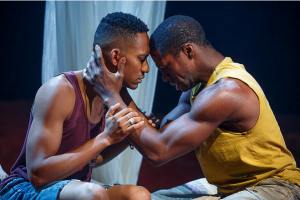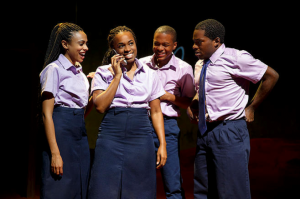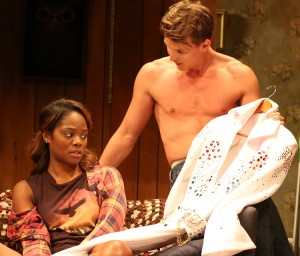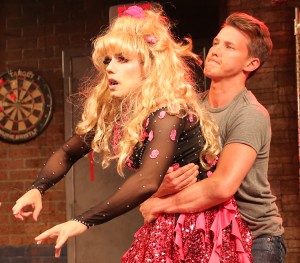Shoes and Baggage is a wildly entertaining one-woman show that explores shopping, and life. Written and performed by stage veteran Cheryl Stern (whose Broadway credits include La Cage aux Folles and The Women) and directed by Joe Barros, both actor and director do a marvelous job of using the cell theater, a small space that is more of a theater in the rectangle than the round. Nonetheless, all seats are good, and musical director John Dipitino’s soundtrack, performed by a two-man band with drum, keyboard and guitar, adds pizzazz and drive to the performance, but don’t overwhelm the diminutively sized actress.
Stern hits the nail on the head when she reveals her conflicted relationship to shopping. She manages a delicate balance between revealing the inner turmoil as well as the ameliorating effects of shopping during some of life’s more difficult moments. The dialogue is intimate but not, as kids today say, TMI (too much information). A self-confessed connoisseur of clothing, shoes and baggage, she recalls her experiences buying her first Louis Vuitton bag and to “buy, or not to buy” a pair of Louboutins that cost as much as her weekly paycheck.
Weaving in past experiences that go all the way back to childhood with more contemporary experiences, Stern does a fantastic job. She touches on relationships that have influenced and informed her appreciation for clothing. Two in particular are with Rena and Karen, whom she remains fast friends with in life and shopping. When Stern first meets Rena in a college acting class, she is completely taken by her. Dressed in a rabbit fur coat, Rena is “urban-sexy in a Bianca Jagger sort of way.” It turns out Rena can’t act but the two form a bond. Akin to this relationship is the one she forms with Karen while out walking her dog one day. Karen is a former Ford model and disco queen and, when they meet, the ad director of Vogue. They embark on many shopping excursions and Karen verses her in the world of couture.
Stern’s play is also an autobiographical account of her experience as an actress. She hilariously renders her experience as a cast member of The Women, a Broadway production that included Cynthia Nixon, Jennifer Tilly and Kristen Johnston. She forms an unlikely bond with Tilly, who has a great appreciation for unusual jewelry and fashion. When Stern compliments Tilly on some rings she’s wearing, she captures Tilly’s relaxed and off-the-cuff cadence with her reply: “Super-cute, right?” They become friends with an appreciation for fashion, and after one particular shopping spree, nearly miss curtain call.
It’s not only the wild forays into shopping that Stern captures, but the addictive nature of it. While trying to return a sweater at a high-end retail store, she ends up leaving with a pair of pants and a top, in addition to the sweater she initially goes in to return. When she sings: “High, totally high from the buy…,” it explains the thrill of going home with new purchases. But then, when she feels compelled to hide them in the closet so her husband won’t see them, there’s the shame in knowing that they exceed her budget, and she failed in returning a sweater that wasn’t really perfect after all.
Stern outlines the way shopping can alleviate some of the stress that occurs in life. When friends get sick with cancer, or lose their jobs, or her father is in the hospital after a heart attack, shopping and an appreciation for clothing, shoes and baggage somehow make the moments more bearable. Yet, as Stern grows older, she comes to recognize that shopping is an addiction as serious as any other. She sings “High, totally hooked on the high, take another hit, like breathing air, oh the lure of what to wear.” Through Debtors Anonymous and self-help books filled with daily affirmations she comes to terms with the fact that shopping is only a high, and not a real antidote to life’s problems. It’s uncertain how she will live without the “high of the buy,” she says, but it seems like it’s time to try and face the music of her addiction, and let that “good buy” go.
Shoes and Baggage, is playing at the cell, 338 West 23rd St. (between 8th & 9th avenues) through June 3.. Take A/C/E train to 8th Ave at 23rd Street. Evening performances are at 7 p.m., Wednesday through Sunday, with matinees at 2 p.m. on Saturday and Sunday. No late seating is permitted. Tickets are $35. For more information, call (646) 861-2253, visit www.thecelltheatre.org.






